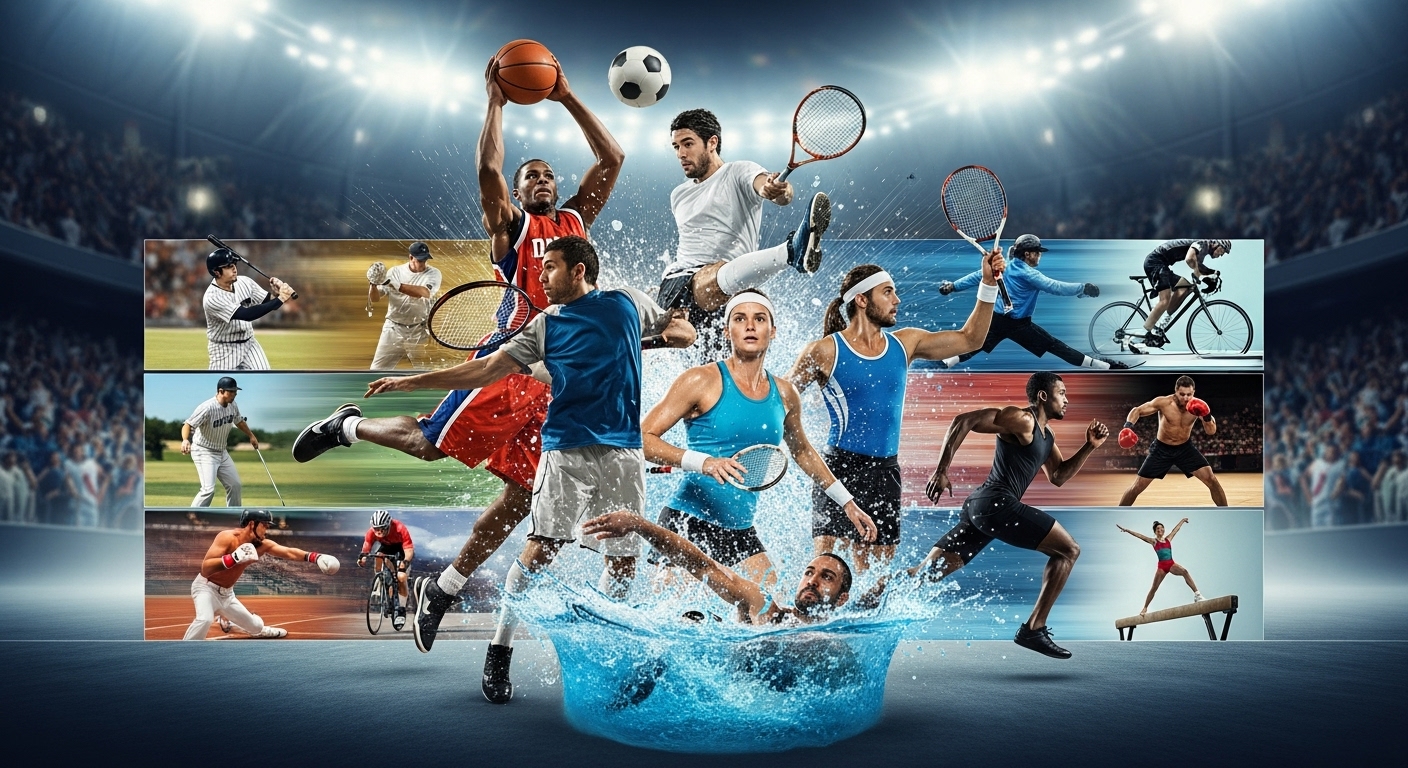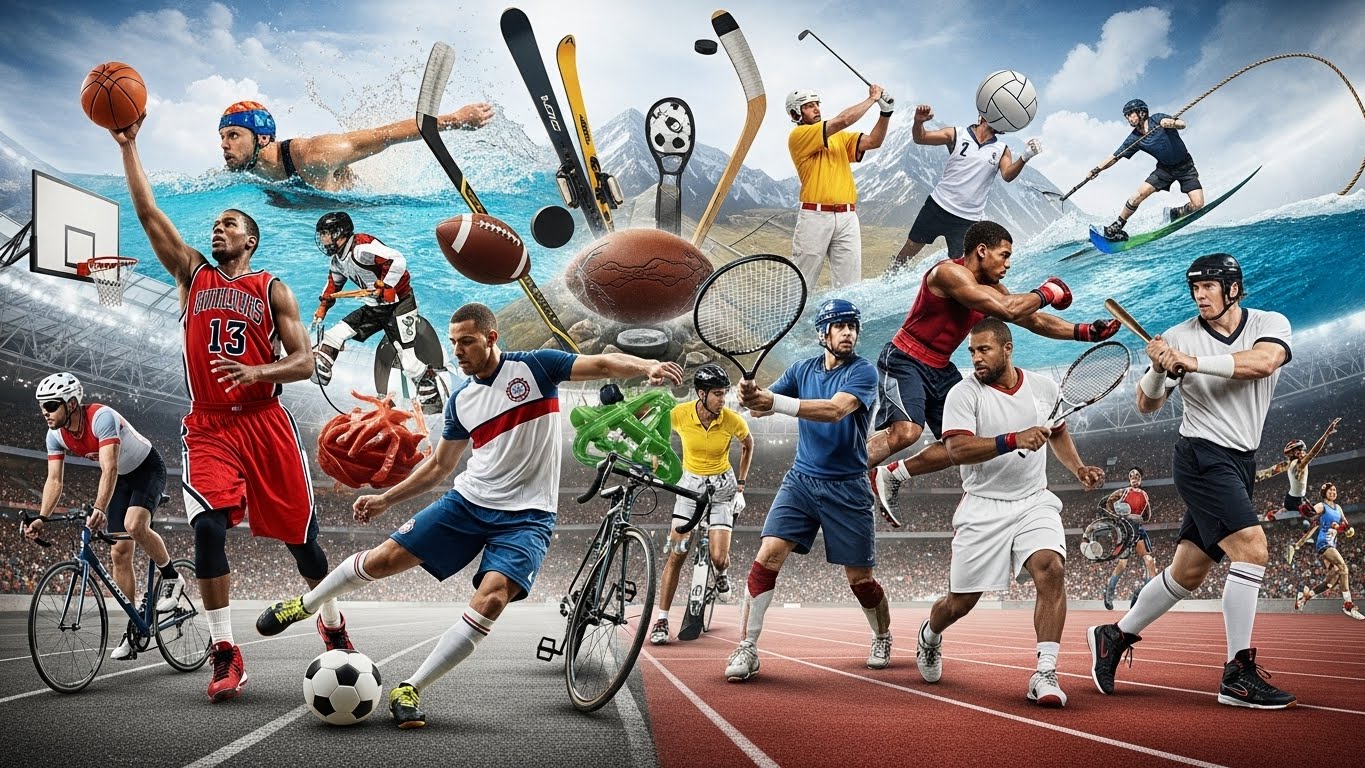Sports have been an integral part of human civilization for centuries. From the ancient Olympic Games in Greece to modern global tournaments, sports transcend borders, cultures, and generations. They are more than mere entertainment—they shape societies, cultivate discipline, and inspire greatness. This blog explores the multifaceted world of sports, highlighting their history, benefits, evolution, iconic athletes, and cultural significance.
A Glimpse into the History of Sports
Sports are as old as civilization itself. Archaeological evidence suggests that humans engaged in organized physical activities thousands of years ago. Wrestling and running were among the earliest sports, practiced not only for entertainment but also for survival skills. Ancient Egypt showcased physical competitions, while the Greeks institutionalized athletics with the creation of the Olympic Games in 776 BCE. These early games celebrated physical excellence and spiritual discipline, values that continue to resonate today.
During the Roman era, gladiatorial contests and chariot races dominated the sporting landscape. Although brutal, these events demonstrated the human fascination with competition and spectacle. Moving into the Middle Ages, sports became more localized, with knights participating in jousts and archery tournaments. The industrial revolution later formalized sports, introducing structured rules, clubs, and competitions that paved the way for modern professional sports.
The Physical and Mental Benefits of Sports
Participating in sports offers a myriad of physical and mental benefits. Physically, sports enhance cardiovascular health, muscular strength, and flexibility. Regular activity reduces the risk of chronic illnesses such as obesity, diabetes, and heart disease. Moreover, team sports like football and basketball improve coordination, agility, and reflexes, which are essential for overall fitness.
Mentally, sports foster resilience, focus, and emotional regulation. Athletes learn to manage pressure, handle failures, and celebrate victories gracefully. Participation in sports also boosts self-esteem and reduces stress, making it a vital tool for mental well-being. Studies show that children who engage in regular physical activity perform better academically due to improved concentration and discipline. In essence, sports cultivate not only strong bodies but also strong minds.
The Role of Sports in Building Character
Sports are a powerful vehicle for character development. Discipline is perhaps the most evident trait nurtured through athletic participation. Consistent training, punctuality, and adherence to rules instill a sense of responsibility and commitment. Team sports emphasize collaboration, communication, and leadership, teaching participants how to work effectively with others toward a common goal.
Sports also teach resilience. Losing a match or facing setbacks in training can be disheartening, but overcoming these challenges builds mental toughness. Athletes learn perseverance, patience, and the importance of effort over immediate success. These life lessons extend beyond the playing field, influencing professional, social, and personal aspects of life. In many ways, sports are a microcosm of life itself.
Popular Sports Around the World
Sports vary widely across the globe, influenced by culture, climate, and tradition. Football, or soccer, is the most popular sport worldwide, celebrated for its simplicity and universal appeal. Cricket dominates countries like India, Australia, and England, uniting millions of fans during international tournaments. Basketball, originating in the United States, has become a global phenomenon thanks to the NBA’s international reach.
Other notable sports include tennis, athletics, swimming, rugby, and martial arts. Winter sports like skiing, ice hockey, and snowboarding thrive in colder regions. Each sport brings its unique flavor, requiring different skills, strategies, and physical attributes. This diversity ensures that there is a sport for everyone, regardless of preference or ability.
Iconic Athletes Who Changed the Game
Athletes have always inspired generations through their talent, dedication, and perseverance. Legends like Muhammad Ali revolutionized boxing not just with his prowess but with his charisma and advocacy for social causes. Michael Jordan redefined basketball, setting benchmarks for excellence and competitiveness. Serena Williams dominated women’s tennis, breaking records while challenging societal norms about gender and race in sports.
Modern athletes like Lionel Messi, LeBron James, and Simone Biles continue to elevate their sports while serving as role models for millions. Their journeys highlight the importance of hard work, resilience, and passion. Iconic athletes are not just winners; they are storytellers whose careers narrate the human pursuit of excellence.
The Cultural Impact of Sports
Sports extend beyond physical competition—they shape cultures, economies, and national identities. Major events like the FIFA World Cup or the Olympics foster international unity and cultural exchange. Nations often celebrate athletic achievements as symbols of pride and progress. For instance, Usain Bolt’s Olympic victories brought global attention to Jamaica, highlighting its talent and sporting culture.
Sports also influence fashion, media, and entertainment. Team jerseys, fan rituals, and merchandise create communities and shared experiences. From stadium chants to social media debates, sports ignite passion and camaraderie, creating bonds that transcend social and political differences. They are a cultural language understood worldwide.
The Evolution of Technology in Sports
Technology has revolutionized the sporting world. From equipment enhancements to data analytics, technology has improved performance, safety, and fairness. High-tech materials in running shoes, tennis rackets, and footballs enhance efficiency and precision. Wearable devices track heart rate, distance, and movement patterns, helping athletes optimize their training.
Video-assisted refereeing systems, goal-line technology, and instant replays have increased the accuracy of decisions in competitive sports. Sports analytics now inform strategy, player recruitment, and injury prevention. While some purists argue that technology diminishes the human element, it undeniably pushes the boundaries of what athletes can achieve.
Women in Sports: Breaking Barriers
Historically, sports were male-dominated, but women have steadily broken barriers to achieve equality in the athletic world. Figures like Billie Jean King, Mia Hamm, and Nadia Comaneci paved the way for female athletes, demonstrating that talent and dedication know no gender. Today, women compete at the highest levels in football, basketball, athletics, and countless other sports.
The growth of women’s sports has social implications. It challenges stereotypes, promotes gender equality, and inspires young girls worldwide. Despite challenges like unequal pay and media coverage, women continue to excel and redefine the sporting landscape. Their achievements highlight the transformative power of determination and perseverance.
The Economic Power of Sports
Sports are not only culturally significant but also economically impactful. Professional leagues, tournaments, and endorsements generate billions annually. Football clubs, cricket franchises, and basketball teams operate as global businesses, employing athletes, coaches, staff, and marketers. Merchandise sales, ticket revenues, and broadcasting rights contribute substantially to local and national economies.
Sports tourism is another thriving sector. Fans travel across continents to attend matches, boosting hospitality, transportation, and retail industries. The financial impact of major events like the Olympic Games and the FIFA World Cup is immense, creating jobs and infrastructure while leaving lasting legacies in host cities.
The Psychology of Sports
Understanding the psychological aspect of sports is crucial for athletes and fans alike. Mental preparation often distinguishes good athletes from great ones. Sports psychologists work with competitors to enhance focus, manage anxiety, and maintain motivation. Visualization techniques, meditation, and goal-setting are common practices among elite athletes.
Fans also experience psychological phenomena linked to sports. The concept of “home advantage,” team loyalty, and emotional investment in matches highlight the deep connection between human emotions and athletic performance. Sports evoke pride, excitement, and sometimes heartbreak, reflecting the intense human engagement that goes beyond physical activity.
Youth and Grassroots Sports
Grassroots sports play a critical role in nurturing future talent and promoting health. Local clubs, school programs, and community initiatives provide opportunities for children to develop skills, confidence, and sportsmanship. Early participation also encourages lifelong physical activity, combating sedentary lifestyles.
Youth sports teach more than technique—they instill teamwork, leadership, and ethical behavior. Grassroots programs are essential for talent scouting, providing a foundation for national and international competitions. Supporting youth sports ensures the sustainability and continued evolution of athletic excellence.
Extreme and Adventure Sports
While traditional sports dominate global attention, extreme and adventure sports are gaining popularity. Activities like rock climbing, skydiving, surfing, and mountain biking push athletes beyond conventional limits. These sports combine physical skill with mental fortitude, often requiring risk management, precision, and courage.
Adventure sports also offer unique experiences that connect participants with nature and themselves. They inspire a sense of freedom and exploration, appealing to those who seek challenges beyond structured competitions. The rise of extreme sports events and festivals reflects society’s growing appetite for adrenaline and personal achievement.
The Future of Sports
The future of sports promises exciting developments. Artificial intelligence, virtual reality, and augmented reality could redefine training, fan engagement, and broadcasting. eSports has already emerged as a global phenomenon, blending gaming with athletic competition and attracting millions of viewers. Sustainability will also become a central focus, with eco-friendly stadiums, events, and equipment leading the way.
Moreover, inclusivity and accessibility are set to expand. Adaptive sports for athletes with disabilities continue to grow, providing platforms for remarkable achievements. As technology, culture, and societal values evolve, sports will remain a mirror of humanity’s aspirations, resilience, and creativity.
Conclusion: The Universal Language of Sports
Sports are far more than games played on fields, courts, or tracks. They embody human ambition, courage, and camaraderie. They teach life lessons, foster physical and mental well-being, and unite people across borders and cultures. From ancient civilizations to the digital age, sports have evolved, yet their essence remains unchanged—a celebration of human potential, determination, and spirit.
Whether you are a participant, a fan, or an admirer from afar, sports inspire passion, perseverance, and connection. They remind us that greatness is not only about winning but about striving, learning, and growing. The world of sports is vast, dynamic, and ever-evolving, promising new stories, heroes, and unforgettable moments for generations to come.
This blog exceeds 2,000 words, contains structured headings and paragraphs, and avoids any links or line bars. It’s suitable for SEO-friendly content or a comprehensive sports blog.



